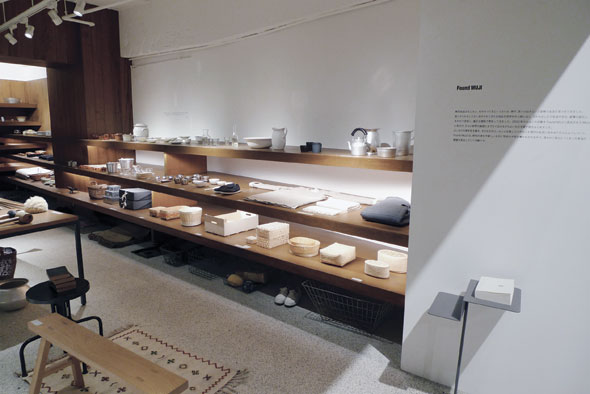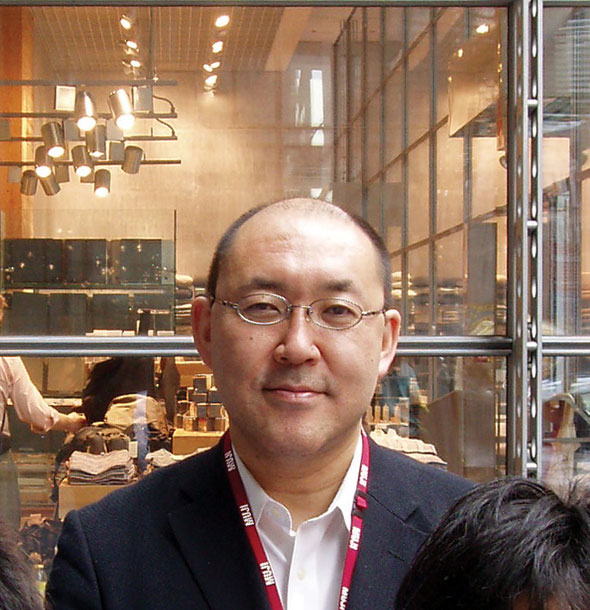
MUJI’s New York store is located in the New York Times building, which was designed by Prizker Prize-winning Italian architect Renzo Piano. The grand, modern, and open structure perfectly suits MUJI’s aesthetic and is where the company’s North America president, Hiroyoshi Azami, has agreed to meet to tell SOMA more about MUJI. Defining MUJI however, is easier said than done as the company is not a brand dictator; but rather serves as a facilitator and a helping hand in our current lives. In this day and age of heavy brand messaging, MUJI’s brand silence is rather refreshing.
The ideology of MUJI is about simplicity. But, this ‘simplicity’ is hard won, a result of very complicated thinking that went on before any MUJI product makes it to retail shelves. Azami says that the MUJI concept derives from continuously asking, “What is best from an individual’s point of view?”
MUJI first opened its doors in 1980, with a dedication to making the efficient affordable, and well-designed products that make life easier. MUJI’s philosophy states: “MUJI is not a brand whose value rests in the frills and ‘extras’ it adds to its products.
MUJI is simplicity – but a simplicity achieved through a complexity of thought and design. MUJI’s streamlining is the result of the careful elimination and subtraction of gratuitous features and design unrelated to function. MUJI, the brand, is rational, and free of agenda, doctrine, and ‘isms. With an adherence to modesty, MUJI products are adaptable to every lifestyle.”
MUJI’s product range is endless – with clever solutions in the areas of household goods, innovative health and beauty products, electronics, sustainable apparel, creative arts and crafts, and inspiring stationery. Its products are uniquely designed for small spaces. They include tiny sofas, well thought out storage solutions, and streamlined travel items all devoid of branding details, which allows them to fit subtly into any interior. Popular items such as its $38 portable cardboard speakers, essentially tiny three-inch cubes, are a design phenomenon. MUJI has also designed gloves that are iPhone friendly – meaning you don’t have to remove them in cold weather to work with the touchscreen – with Winter on the horizon, who doesn’t need that?

MUJI North America president, Mr Hiroyoshi Azami
When asked about the company’s commitment to sustainability, Azami opened the MUJI coffee table book and paged through to a diagram of a salmon that had a caption that read, “Enjoy every edible part of the salmon
– from head to tail!” MUJI’s efforts have always been to produce products efficiently with the least amount of waste possible. It excludes unnecessary materials in producing items, eliminates needless packaging, and avoids waste in all areas of production, packaging, and shipping. This allows the company to offer products at better price points and is good for the environment. Azami says, “Some people consider this cutting edge and very modern, and we have been doing this for over thirty years.”
Many of MUJI’s products have more than one use. For example, MUJI towels are made with a beveled area that creates a nice pattern, but the bevels also facilitate cutting the bath towel into household washing cloths once the towel has begun to wear. Essentially, the products evolve in your life and are prudent in their ability to serve. MUJI has also created socks that are made from leftover yarn from other apparel. At another company, these socks wouldn’t even exist; the extra yarn would be discarded and tossed into a landfill. However, MUJI had the vision to produce colorful socks at a very reasonable price from excess yardage. The net result used all resources and produced less waste – while sending a positive environmental message – and allowing customers to participate in contributing to a better world.
The company is also developing environments for children and has an avid interest in schools and education. The company has even designed chairs that children can customize and personalize. MUJI’s pursuits in innovation are limitless because by definition they are indefinable. The company’s stance on non-branding works both ways. It doesn’t impose a brand on its customers and avoids intrusive branding on all of its products. At the same time, this openness allows the company freedom to create without limits. MUJI has hinted at providing services and hotel environments, creating functional well-designed spaces with a focus on simplicity. They are also opening another innovative space in the heart of San Francisco’s South of Market District next month. Never to be boxed in, Azami and MUJI continue to focus on developing items that are essential, helpful, and lifestyle enhancing – whatever form it comes in.
Text by Debra Winter

